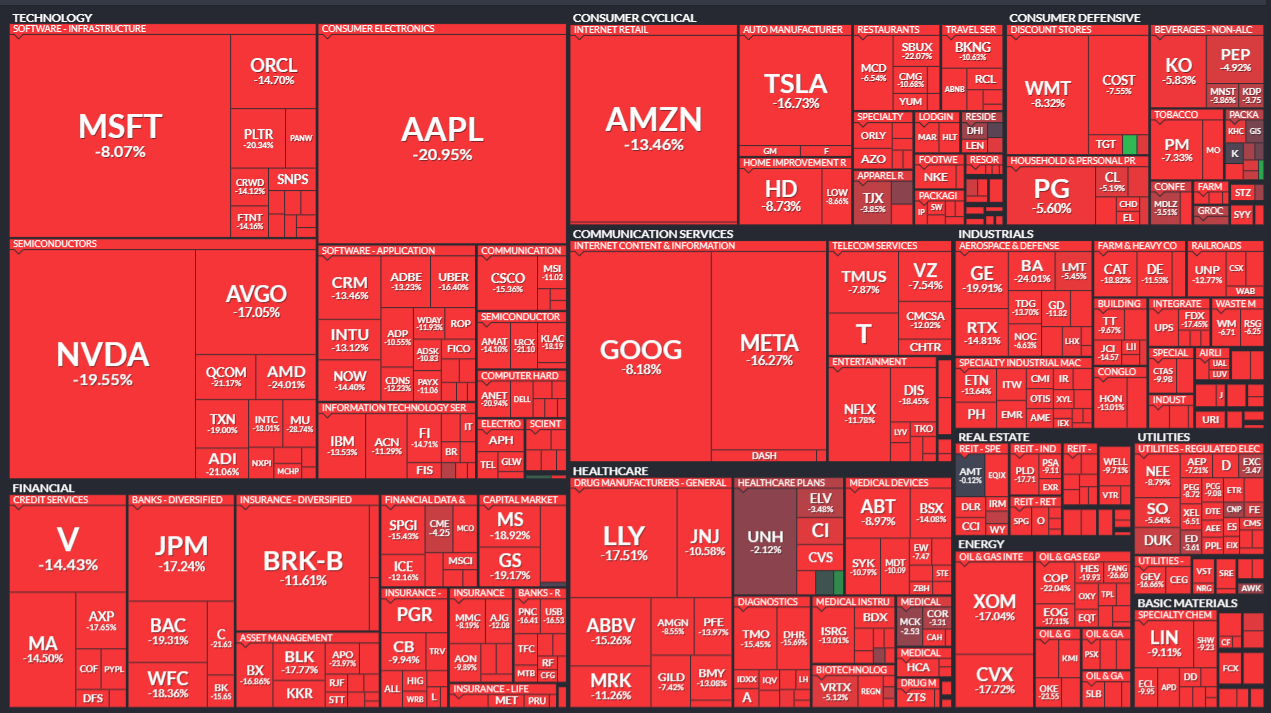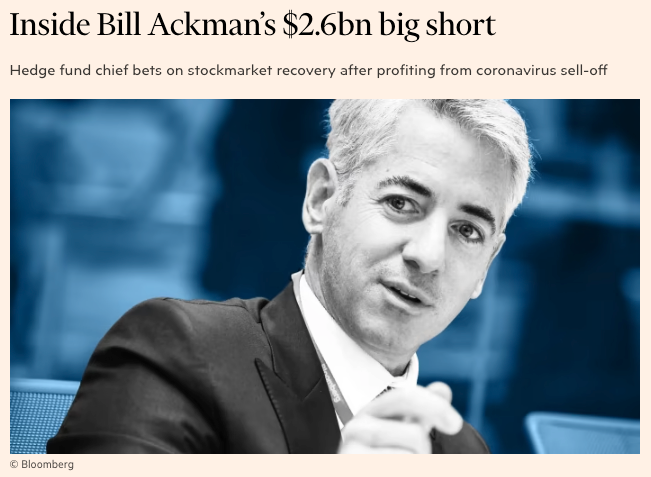As I was about to start writing this post, the markets went into turmoil, wiping out billions of dollars in value thanks to Trump's latest tariffs. Just look at this S&P500 chart as of 7 April 2025 👇

Your Twitter feed is probably full of people claiming they saw it coming.
This is when you need a solid investment philosophy most.
This post won't tell you what stocks to buy. I won't analyze Trump's tariffs or predict the Fed's next move. Instead, I want to talk about something more fundamental—how to think about investing when it feels like the world is losing its mind.
Your strategy is only as good as the foundation supporting it.
Investment philosophy is like a compass in a storm. Without one, every market sell-off feels existential. With one, you're just adjusting sails while staying on course.
What a Solid Philosophy Does
A good investment philosophy helps you:
Keep calm when markets go crazy (and they will). Make decisions that align with your real goals. Avoid mistakes that wipe you out. Play your own game, not everyone else's.
This is my philosophy for managing wealth. It's built on painful lessons, a few lucky breaks, and everything I've learned.
Take what works. Ignore the rest. But develop something to guide you.
Start With Why: Know Your Reason
I meet so many people investing without asking themselves, "What am I trying to accomplish?"
In my earlier piece on building generational wealth, I discussed game levels in the Capital Founder's Quest.
Level one is building a portfolio that generates enough income so you don't have to work unless you want to.
Once you complete this level, you move to the next one.
Level 1: Replace your "time for money" income with passive returns
Level 2: Fund bigger dreams—villa with a sea view, sports car, kids' education, whatever you always wanted
Level 3: Preserve wealth to pass it on
Level 4: Invest for impact, curiosity, or just because it's fun
Different levels require different approaches. What you need when building wealth isn't what you need when preserving it.
I've seen this firsthand. People who made fortunes in business decide to play a different game and start investing. They had higher risk tolerance and overconfidence from past success. They focused solely on high-risk investments. Unfortunately, this led to significant losses.
Here's the truth about money that took me a while to learn.
Its value isn't what you can buy. It's the freedom it gives you over your time.
Figure out your magic number. Build everything around that.
Understand Risk (Actually Understand It)
Everyone says "investing is risky." But ask them what that means. Very few can explain anything beyond "you can lose money."
Financial markets are basically a giant machine for transferring risk.
Entrepreneurs take concentrated bets to build companies. They risk almost everything. Investors buy pieces of that risk for potential returns. Different asset classes are just different types of risk—from "risk-free" Treasury bonds yielding 5% to early-stage startups where you can get 100x your money or lose it all.
The more risk you take, the more return you should expect. But that doesn't mean you'll get it. And sometimes, big risks hide in perfectly safe places. Remember Credit Suisse?
Risk isn't just volatility. It's permanent loss of capital. Not having cash when you desperately need it. Being forced to sell at the wrong time.
The Black Swan or Tail Risk
A Black Swan isn't just a bad day in the market, even a 10-20% decline. It's not a recession everyone sees coming. It's an event beyond normal expectations that reshapes everything.
The 2008 financial crisis saw two major investment banks collapse. AAA-rated securities became worthless. COVID-19 locked everyone home. Oil futures went negative. The Russia-Ukraine war turned Ukrainian lives upside down overnight.
History is full of examples that "couldn't happen"—until they did.
The funny thing about Black Swans? If all financial experts are predicting it, it's not a Black Swan. It's just noise. Ignore it.
Always Protect the Downside
Regardless of your net worth, things can change in the blink of an eye.
"Just because you're paranoid doesn't mean they aren't after you." —Joseph Heller
Wall Street rewards risk-takers. But paranoid control freaks build the most resilient portfolios and long-term returns.
Ask anyone who's lost a fortune—capital preservation isn't boring conservative strategy. It's everything. No matter how much you have, it can vanish faster than you think.
History's best investors understood this.
- John Paulson made $20 billion betting against subprime mortgages during the financial crisis.
- Mark Spitznagel's Universa Investments delivered a mind-blowing 4,144% return in Q1 2020 using tail-risk hedges.
- Bill Ackman turned a $27 million investment in CDSs into $2.7 billion in 30 days, leading some to refer to it as the greatest trade ever.

These are tail risk strategies. They work as insurance. You pay a premium. But when something happens, returns from these strategies offset losses and give you cash to buy assets at discounted prices.
Successful investors survived major crashes not because they timed markets perfectly. They had built-in circuit breakers.
Serious cash reserves. Assets that don't all move in the same direction. Position sizes that ensure no single investment can sink them. Insurance against tail risk.
Ask yourself:
Could your portfolio take a 40% hit and you'd still be okay? Do you have downside protection, or are you just hoping? What's your "sleep-at-night" number that keeps you calm during crashes?
Hope for the best. Plan for the worst. That's how you stay in the game long enough to win.
Concentration vs. Diversification: Know Your Stage
Two schools of thought exist:
"Don't put all your eggs in one basket." That's probably what your grandparents told you.
But there is also this one
"Put all your eggs in one basket—and watch that basket like a hawk." —Andrew Carnegie
Which is right? Both.
But it depends entirely on your stage.
If you're building wealth:
Concentration can work wonders. Almost every fortune was created that way. Founders betting everything on their company. Employees loading up on stock options. VCs looking for the next unicorn.
If you're preserving wealth:
Diversification isn't just smart—it's essential. Your returns might not make for exciting dinner conversation. But you'll never worry about money again.
You don't have to pick one approach forever. Know where you are now. Act accordingly. You can also allocate capital to different risk buckets. Have some money to play with but don't risk it all.
Disregard the Noise
Financial media isn't designed to help you invest better. It's designed to keep you watching and clicking. Brokers incentivize you to trade so they earn commissions. It makes them rich, not you.
Markets move for thousands of reasons that never make headlines.
Massive index funds rebalancing portfolios. Hedge funds getting margin calls and liquidating positions. Pension funds deploying billions on predetermined schedules. Trading algorithms triggering cascading orders. Options expiration mechanics distorting stock prices.
None of these make sexy headlines. But they move markets. Today, with so much fake news and misinformation, you can never know the real reasons behind events.
That's why I don't have a TV and rarely watch or read the news. It feels like everyone lies.
The market just popped 7% in just a few minutes on a complete rumor of a 90 day pause in tariffs which apparently started on X. Then crashed just as fast when White House said it's "fake news"... Interesting... pic.twitter.com/cQw3ngTc4s
— Dan Elton (@moreisdifferent) April 7, 2025
Unless you're sitting at a trading desk with institutional-grade infrastructure and proper research, stop trying to outsmart every market move.
Investing isn't about reacting to headlines. It's about methodically allocating capital toward long-term goals while everyone else is distracted by noise.
Investing is a long-term game. Think years and decades.
Investing is About Psychology More Than Numbers
Unless you're a professional investor, read some books about behavioral finance. Understand the driving forces behind your decisions.
Your biggest investment risk isn't inflation, interest rates, or recessions. It's you. Your fear. Your greed. Your FOMO when your neighbor's crypto goes 10x.
How do you fight your worst instincts? Build systems that protect you from yourself.
Create rules before you need them. When you think clearly, decide what would make you buy or sell.
Keep an investment journal. Write down what you're buying or selling, why, and how you feel. You'll be shocked at the patterns that emerge.
Build in cooling-off periods. Give yourself 48 hours for any significant investment decision. The best decisions rarely happen in moments of peak emotion.
Find someone who can give you honest opinions. Whether a friend or professional adviser, you need someone who can say, "You're not thinking clearly right now."
Read Morgan Housel's "The Psychology of Money" or Daniel Kahneman's "Thinking, Fast and Slow."
Know Your Investor Archetype
Like a role-playing game, knowing your character archetype helps you navigate the quest better. After years working with wealthy clients, I've noticed distinct investor types.
The Operator-Turned-Investor
You built and sold a business. You want to stay active, so now you're investing that capital. You bring real operational expertise but might struggle with passive investing. Your risk tolerance is high. You might go all-in on higher-risk investments you don't fully understand. This is the danger zone. Public markets work differently from business.
What to do: Hire a financial adviser or wealth manager. Allocate most assets to a long-term diversified portfolio. Put aside some capital to play with. Invest in startups or private companies—spaces you understand. Mentor founders. It's satisfying.
The Capital Preserver
You're focused on not losing what you've built or inherited. Often second or third-generation wealth that's seen what can go wrong. But can also be first generation who decided to change direction.
Similar advice: Find a financial adviser who can create a long-term portfolio. Focus on things you enjoy.
The Allocator
This is institutionalized private wealth—a family office. You need at least $250M+ in assets. Hire a professional investment team. Run it as a business where costs must be covered and significant returns generated.
The Moonshot Maximalist
You're comfortable putting money into high-risk, high-reward opportunities. You know most will fail. You're hunting for asymmetric returns that change everything. This is the rare type.
Elon Musk is a good example.
In 2002, he sold PayPal to eBay and made $180M. Musk allocated $100M to SpaceX and $70M to Tesla, leaving minimal liquidity. By 2008, only $40M remained.
Both companies nearly failed simultaneously in 2008. SpaceX's third Falcon 1 rocket failure threatened closure. Tesla faced bankruptcy two days before Christmas. Musk was "more than broke"—in debt.
Then luck turned. NASA awarded SpaceX a $1.6B contract. Tesla's 2009 Daimler investment and 2010 IPO marked the turnaround.
Today, Elon Musk's net worth is about $350 billion.
Philosophy Before Tactics
After years doing this, I've learned most people don't have an investment philosophy. They have a collection of reactions to market events. They chase returns. They follow trends. They buy high and sell low repeatedly.
If you've run a business, you know the importance of a business plan and strategy. An investment plan is the same.
But you're different. You're building wealth intentionally. That starts with clear thinking about why you're investing.
Your investment philosophy isn't just about making money. It's about aligning capital with your values, goals, and the life you want. It's about creating a framework that lets you act decisively when everyone else is frozen with fear or drunk on greed.
Know your why. Protect your downside. Play your own game.
You don't need to be the smartest person in the market. You must stay in the game long enough to let compounding work its magic.
Remember: Survive first. Thrive later.






